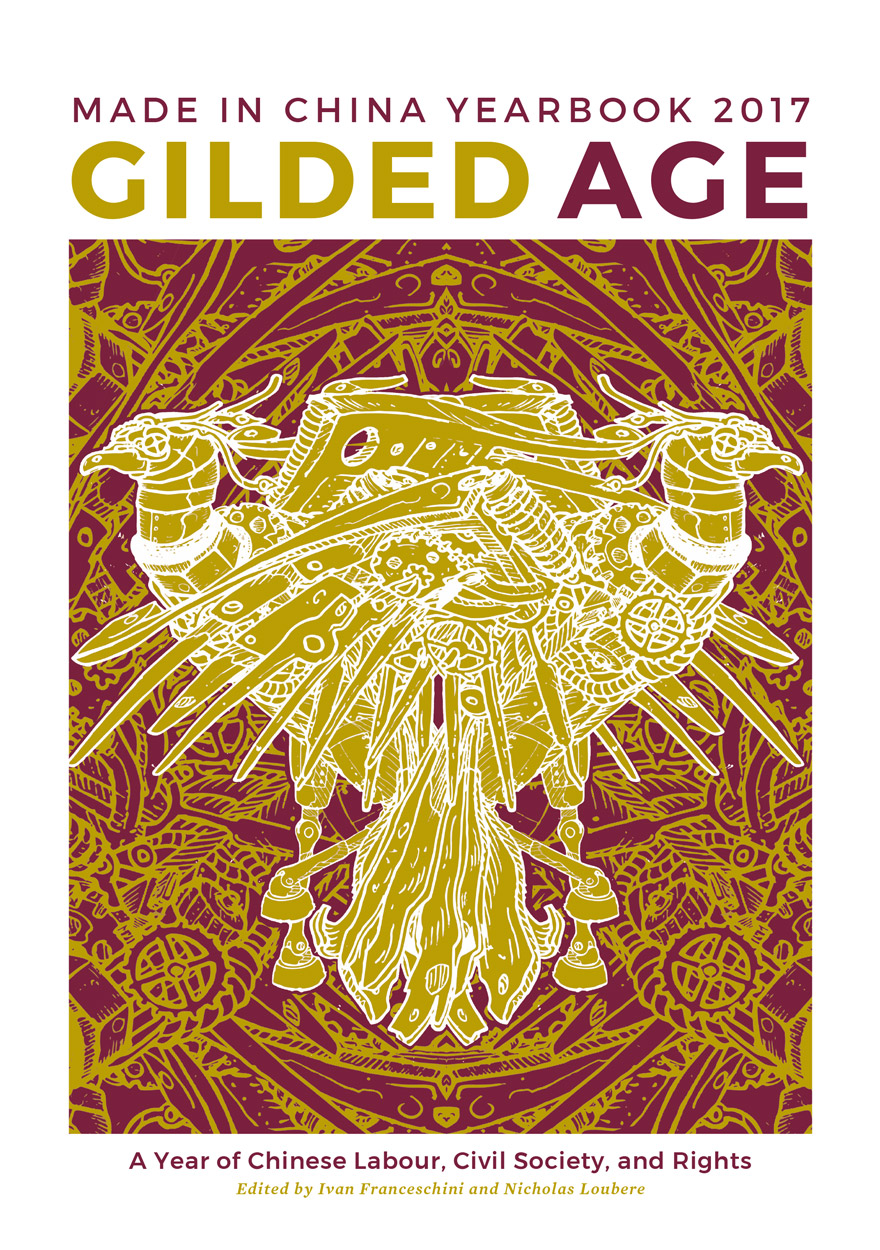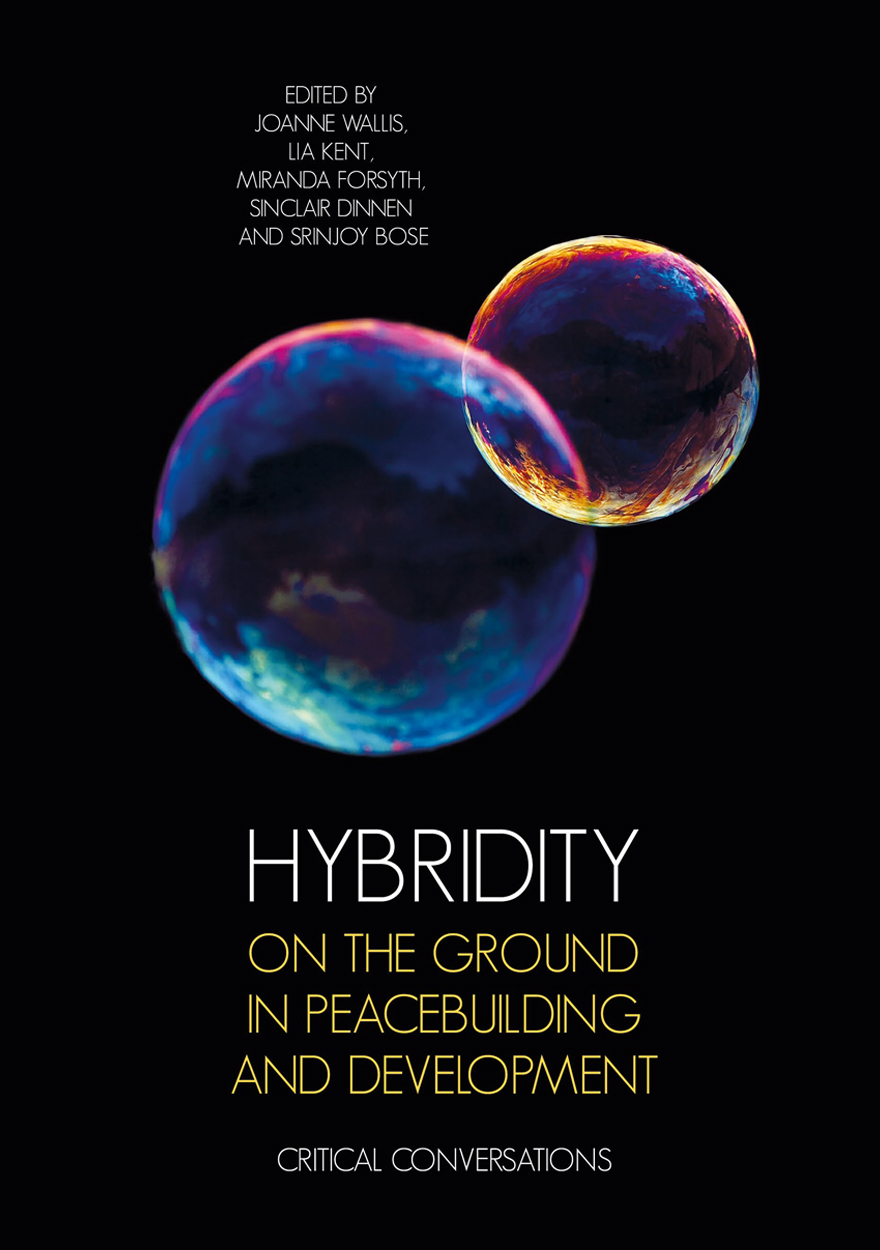Search titles
Displaying results 241 to 250 of 855.

Gilded Age »
Made in China Yearbook 2017
Edited by: Ivan Franceschini, Nicholas Loubere
Publication date: April 2018
According to the Chinese zodiac, 2017 was the year of the ‘fire rooster’, an animal often associated with the mythical fenghuang, a magnificently beautiful bird whose appearance is believed to mark the beginning of a new era of peaceful flourishing. Considering the auspicious symbolism surrounding the fenghuang, it is fitting that on 18 October 2017, President Xi Jinping took to the stage of the Nineteenth Party Congress to proclaim the beginning of a ‘new era’ for Chinese socialism. However, in spite of such ecumenical proclamations, it became immediately evident that not all in China would be welcome to reap the rewards promised by the authorities. Migrant workers, for one, remain disposable. Lawyers, activists and even ordinary citizens who dare to express critical views also hardly find a place in Xi’s brave new world. This Yearbook traces the stark new ‘gilded age’ inaugurated by the Chinese Communist Party. It does so through a collection of more than 40 original essays on labour, civil society and human rights in China and beyond, penned by leading scholars and practitioners from around the world.

Skin, Kin and Clan »
The dynamics of social categories in Indigenous Australia
Publication date: April 2018
Australia is unique in the world for its diverse and interlocking systems of Indigenous social organisation. On no other continent do we see such an array of complex and contrasting social arrangements, coordinated through a principle of ‘universal kinship’ whereby two strangers meeting for the first time can recognise one another as kin. For some time, Australian kinship studies suffered from poor theorisation and insufficient aggregation of data. The large-scale AustKin project sought to redress these problems through the careful compilation of kinship information. Arising from the project, this book presents recent original research by a range of authors in the field on the kinship and social category systems in Australia. A number of the contributions focus on reconstructing how these systems originated and developed over time. Others are concerned with the relationship between kinship and land, the semantics of kin terms and the dynamics of kin interactions.

Opening Government »
Transparency and Engagement in the Information Age
Edited by: John Wanna, Sam Vincent
Publication date: April 2018
Transparency and citizen engagement remain essential to good government and sound public policy. Indeed, they may well be the key to restoring trust in government itself, currently at an all-time low in Australia. It is ironic, then, that this has occurred at a time when the technological potential for information dissemination and interaction has never been greater.
Opening Government: Transparency and Engagement in the Information Age explores new horizons and scenarios for better governance in the context of the new information age, focusing on the potentials and pitfalls for governments (and governance more broadly) operating in the new, information-rich environment. Its contributors, a range of international and Australian governance academics and practitioners, ask what are the challenges to our governing traditions and practices in the new information age, and where can better outcomes be expected using future technologies. They explore the fundamental ambiguities extant in opening up government, with governments intending to become far more transparent in providing information and in information sharing, but also more motivated to engage with other data sources, data systems and social technologies.

Double Disillusion »
The 2016 Australian Federal Election
Publication date: April 2018
This book provides a comprehensive analysis of the 2016 Australian federal election. Won by the Liberal–National Coalition by the slimmest of margins, the result created a climate of political uncertainty that threatened the government’s lower house majority. While the campaign might have lacked the theatre of previous elections, it provides significant insights into the contemporary political and policy challenges facing Australian democracy and society today.
In this, the 16th edited collection of Australian election studies, 41 contributors from a range of disciplines bring an unprecedented depth of expertise to the 2016 contest. The book covers the context, key battles and issues in the campaign, and reports and analyses the results in detail. It provides an evaluation of the role of political actors such as the parties, independents, the media, interest groups and GetUp!, and examines election debate in the online space. Experts from a range of policy fields provide an analysis of election issues ranging from the economy and industrial relations to social policy, the environment, and gender and sexuality. Each of the chapters is written on the basis of in‑depth and original research, providing new insights into this important political event.

Made in China Journal: Volume 3, Issue 1, 2018 »
Publication date: March 2018
On 12 May 2008, a 7.9 magnitude earthquake hit Wenchuan county, Sichuan province. Felt as far as Beijing, the tremors caused horrific damage: 69,229 people died and 17,923 went missing. Yet, the aftermath of the seism was also a time of hope—with Chinese citizens from all over the country outdoing each other to show solidarity with the victims. As local governments began to recognise the importance of NGOs in providing disaster relief and social services, 2008 was widely seen as a ‘Year Zero’ for Chinese civil society. At that time, hardly anybody could have foreseen the wave of repression against civil society that was to come and that is today the norm. This issue looks back at the legacy of this disaster, and the ways in which state and civil society actors renegotiate their positions during ‘states of emergency’.
Download for free
Not available for purchase

Hybridity on the Ground in Peacebuilding and Development »
Critical Conversations
Publication date: March 2018
Hybridity on the Ground in Peacebuilding and Development engages with the possibilities and pitfalls of the increasingly popular notion of hybridity. The hybridity concept has been embraced by scholars and practitioners in response to the social and institutional complexities of peacebuilding and development practice. In particular, the concept appears well-suited to making sense of the mutually constitutive outcomes of processes of interaction between diverse norms, institutions, actors and discourses in the context of contemporary peacebuilding and development engagements. At the same time, it has been criticised from a variety of perspectives for overlooking critical questions of history, power and scale. The authors in this interdisciplinary collection draw on their in‑depth knowledge of peacebuilding and development contexts in different parts of Asia, the Pacific and Africa to examine the messy and dynamic realities of hybridity ‘on the ground’. By critically exploring the power dynamics, and the diverse actors, ideas, practices and sites that shape hybrid peacebuilding and development across time and space, this book offers fresh insights to hybridity debates that will be of interest to both scholars and practitioners.
‘Hybridity has become an influential idea in peacebuilding and this volume will undoubtedly become the most influential collection on the idea. Nuance and sophistication characterises this engagement with hybridity.’
— Professor John Braithwaite

East Asia Forum Quarterly: Volume 10, Number 1, 2018 »
Publication date: March 2018
East Asia Forum Quarterly grew out of East Asia Forum (EAF) online, which has developed a reputation for providing a platform for the best in Asian analysis, research and policy comment on the Asia Pacific region in world affairs. EAFQ aims to provide a further window onto research in the leading research institutes in Asia and to provide expert comment on current developments within the region. The East Asia Forum Quarterly, like East Asia Forum online, is an initiative of the East Asia Forum (EAF) and its host organisation, the East Asian Bureau of Economic Research (EABER) in the Crawford School of Economics and Government in the College of Asia & the Pacific at The Australian National University.
Download for free
Not available for purchase

China's New Sources of Economic Growth: Vol. 1 (Chinese version) »
改革、资源能源与气候变化
Edited by: 宋 立刚, Ross Garnaut, 蔡 昉, Lauren Johnston
Publication date: February 2018
本书针对近年来中国经济增速的下滑,从供给侧角度出发,探讨中国如何启动经 济增长的新源泉,论证了通过改革进一步提高劳动生产率的重要性。全书分为两个部 分,第一部分为“改革与宏观经济发展”,主要内容包括宏观经济的展望、新经济增 长模式、新型城镇化、互联网金融的发展、供给侧结构性改革、中国的全球投资、农 民工的储蓄与消费行为、证券市场的泡沫检验、企业层面的杠杆率与去杠杆进程等;第二部分为“资源、能源、环境与气候变化”,主要内容包括中国低碳城市发展、能 源政策的变化、钢铁产业重组、工业用水和能耗趋势、水资源和森林资源的保护、电 力行业与环境保护的关系以及中国气候环境战略面临的挑战等。
Chinese print version of this book is available from Social Science and Academic Press

Cascades of Violence »
War, Crime and Peacebuilding Across South Asia
Authored by: John Braithwaite, Bina D’Costa
Publication date: February 2018
War and crime are cascade phenomena. War cascades across space and time to more war; crime to more crime; crime cascades to war; and war to crime. As a result, war and crime become complex phenomena. That does not mean we cannot understand how to prevent crime and war simultaneously. This book shows, for example, how a cascade analysis leads to an understanding of how refugee camps are nodes of both targeted attack and targeted recruitment into violence. Hence, humanitarian prevention also must target such nodes of risk. This book shows how nonviolence and nondomination can also be made to cascade, shunting cascades of violence into reverse. Complexity theory implies a conclusion that the pursuit of strategies for preventing crime and war is less important than understanding meta strategies. These are meta strategies for how to sequence and escalate many redundant prevention strategies. These themes were explored across seven South Asian societies during eight years of fieldwork.

Value for Money »
Budget and financial management reform in the People's Republic of China, Taiwan and Australia
Publication date: January 2018
The Greater China Australia Dialogue on Public Administration has held annual workshops since 2011 on public administration themes of common interest to the People’s Republic of China, Taiwan and Australia.
This book presents and discusses a selection of papers developed from the Dialogue’s fifth workshop held in late 2015 hosted by the National Taiwan University in Taipei. The theme, ‘Value for Money’, focused on budget and financial management reforms, including how different nations account for the relative performance of their public sectors.
All governments face the challenge of scarce resources requiring budgetary management processes for identifying the resources required by and available to government, and then for allocating them and ensuring their use or deployment represents value for money. Such budgetary and financial management processes need to inform decision-making routinely and protect the integrity of the way public resources are used – with some public accountability to indicate that their uses are properly authorised and reflect the policies of legitimate government leaders.
The chapters in this book explore budgeting and financial management in three very different jurisdictions: Australia, the People’s Republic of China and the Republic of China (Taiwan). These activist and at times innovative countries are keen to analyse and reflect upon each other’s policy achievements and patterns of public provision. They are keen to learn more about each other as their economic and social engagement continues to deepen. They are also conscious that fundamental differences exist in terms of economic development and global strategic positioning, and levels and philosophies of political development; to an extent these differences are representative of differences amongst countries around the globe.



